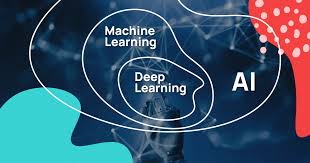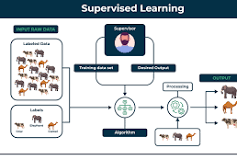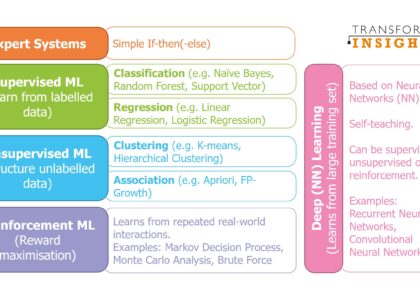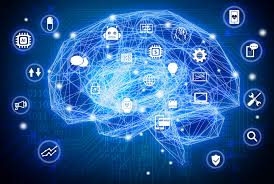New Innovations in Technology: Shaping the Future
The world of technology is ever-evolving, with new innovations continuously reshaping industries and altering the way we live and work. From artificial intelligence to quantum computing, the latest technological advancements are paving the way for a future that was once only imaginable in science fiction.
Artificial Intelligence and Machine Learning
Artificial Intelligence (AI) and machine learning have made significant strides in recent years. These technologies are now being integrated into various sectors, from healthcare to finance, offering unprecedented capabilities. AI-powered diagnostic tools are improving patient outcomes by providing more accurate diagnoses, while machine learning algorithms are enhancing financial models to better predict market trends.
Quantum Computing
Quantum computing is another groundbreaking innovation that promises to revolutionise industries. Unlike traditional computers, which use bits as the smallest unit of data, quantum computers use qubits. This allows them to process complex calculations at speeds previously thought impossible. Quantum computing holds immense potential for fields such as cryptography, materials science, and drug discovery.
5G Connectivity
The rollout of 5G networks is transforming connectivity across the globe. With faster speeds and lower latency compared to its predecessors, 5G is enabling new possibilities in areas like autonomous vehicles, smart cities, and the Internet of Things (IoT). This next-generation network infrastructure supports more robust connections between devices, facilitating real-time data exchange and analysis.
Blockchain Technology
Blockchain technology continues to gain traction beyond its initial application in cryptocurrencies. Its ability to provide secure and transparent record-keeping makes it ideal for industries such as supply chain management, finance, and healthcare. By ensuring data integrity and reducing fraud risk, blockchain is becoming a cornerstone of digital trust.
Sustainable Technologies
Sustainability has become a crucial focus for innovators seeking to address environmental challenges. Advances in renewable energy technologies—such as solar panels with higher efficiency rates and wind turbines with improved design—are making clean energy more accessible. Additionally, developments in battery storage solutions are enhancing energy management capabilities for both consumers and businesses.
The Future Outlook
The pace of technological innovation shows no signs of slowing down. As these advancements continue to unfold, they will undoubtedly bring about further changes across all aspects of life. Embracing these technologies responsibly will be key to unlocking their full potential while ensuring ethical considerations are met.
In conclusion, new innovations in technology hold promise not only for advancing industry capabilities but also for addressing some of society’s most pressing issues. By staying informed about these developments and understanding their implications, individuals and organisations can better prepare themselves for a rapidly changing future.
Exploring the Future: Key Questions on Emerging Technological Innovations
- What are the latest technological innovations shaping the future?
- How is artificial intelligence revolutionising various industries?
- What impact does quantum computing have on traditional computing methods?
- How does 5G connectivity differ from previous generations of wireless networks?
- What are the potential applications of blockchain technology beyond cryptocurrencies?
- How are sustainable technologies contributing to environmental conservation efforts?
- What ethical considerations should be taken into account when adopting new technologies?
- How can individuals and businesses stay updated on emerging technological trends?
- What challenges may arise with the rapid pace of technological advancements?
What are the latest technological innovations shaping the future?
The latest technological innovations shaping the future encompass a diverse range of advancements that are revolutionising industries and daily life. From artificial intelligence and machine learning driving unprecedented levels of automation and decision-making to quantum computing unlocking new realms of computational power, the landscape of innovation is vast and dynamic. 5G connectivity is paving the way for enhanced communication networks, while blockchain technology is reshaping how data is stored and shared securely. Sustainable technologies are also playing a pivotal role in addressing environmental challenges, with renewable energy solutions and efficient battery storage systems leading the charge towards a more sustainable future. These innovations collectively showcase the transformative power of technology in shaping a world that is increasingly interconnected, efficient, and sustainable.
How is artificial intelligence revolutionising various industries?
Artificial intelligence (AI) is revolutionising various industries by automating processes, enhancing decision-making, and providing personalised experiences. In healthcare, AI algorithms are used to analyse medical images and predict patient outcomes with greater accuracy, leading to improved diagnostics and treatment plans. In the financial sector, AI-driven models assess risk more effectively and detect fraudulent activities in real-time. Retail businesses benefit from AI through personalised marketing strategies and inventory management systems that anticipate consumer demand. Moreover, in manufacturing, AI-powered robots streamline production lines, increasing efficiency and reducing costs. Overall, AI’s ability to process vast amounts of data quickly and accurately is transforming how industries operate, driving innovation and fostering growth across the board.
What impact does quantum computing have on traditional computing methods?
Quantum computing represents a paradigm shift in the world of technology, offering capabilities that surpass the limitations of traditional computing methods. One of the key impacts of quantum computing on traditional computing methods lies in its ability to process vast amounts of data at unprecedented speeds due to the unique properties of qubits. Unlike classical bits, which can only exist in one state (0 or 1) at a time, qubits can exist in multiple states simultaneously, enabling quantum computers to perform complex calculations exponentially faster. This advancement has the potential to revolutionise fields such as cryptography, optimisation problems, and scientific simulations, where traditional computers struggle to provide efficient solutions. As quantum computing continues to advance, its influence on traditional computing methods will likely drive innovation and inspire new approaches to solving complex problems in ways previously thought unattainable.
How does 5G connectivity differ from previous generations of wireless networks?
5G connectivity represents a significant leap forward from previous generations of wireless networks in several key ways. Unlike its predecessors, 5G offers substantially faster data speeds, lower latency, and increased network capacity. This means that users can experience quicker downloads, smoother streaming, and more responsive connections. Additionally, 5G enables a higher density of connected devices, paving the way for the widespread adoption of IoT devices and applications. The technology’s advanced capabilities have the potential to revolutionise industries such as healthcare, transportation, and manufacturing by enabling real-time data transmission and enhancing overall efficiency.
What are the potential applications of blockchain technology beyond cryptocurrencies?
The potential applications of blockchain technology extend far beyond cryptocurrencies, offering innovative solutions across various industries. Blockchain’s secure and transparent nature makes it ideal for transforming supply chain management by providing a tamper-proof record of product origins and movements. In healthcare, blockchain can enhance data security and interoperability, enabling seamless sharing of patient records among healthcare providers while maintaining privacy. Additionally, the technology has the potential to revolutionise voting systems by ensuring transparency and integrity in elections. These examples showcase how blockchain technology has the power to streamline processes, enhance trust, and drive efficiency in diverse sectors beyond the realm of digital currencies.
How are sustainable technologies contributing to environmental conservation efforts?
Sustainable technologies play a pivotal role in environmental conservation efforts by offering innovative solutions that reduce carbon emissions, minimise waste, and promote resource efficiency. Technologies such as solar panels, wind turbines, and electric vehicles harness renewable energy sources to power homes, businesses, and transportation systems, thereby decreasing reliance on fossil fuels and mitigating greenhouse gas emissions. Additionally, advancements in energy storage systems and smart grid technologies enhance the integration of renewable energy into existing infrastructure, enabling more reliable and sustainable energy distribution. By adopting sustainable technologies, industries can lower their environmental impact while contributing to global conservation initiatives aimed at preserving our planet for future generations.
What ethical considerations should be taken into account when adopting new technologies?
When adopting new technologies, it is crucial to consider a range of ethical considerations to ensure responsible and sustainable implementation. One key aspect is data privacy and security, as the use of advanced technologies often involves collecting and processing sensitive information. Transparency in how data is handled, obtaining user consent, and implementing robust security measures are essential to safeguarding privacy rights. Additionally, fairness and accountability must be prioritised to prevent biases in algorithms and decision-making processes. Ensuring inclusivity and accessibility for all individuals, regardless of background or ability, is also paramount when deploying new technologies. Lastly, ongoing monitoring and evaluation are necessary to address any unintended consequences and mitigate potential risks that may arise from the adoption of innovative technologies. By proactively addressing these ethical considerations, organisations can harness the benefits of new innovations while upholding ethical standards and societal values.
How can individuals and businesses stay updated on emerging technological trends?
Staying updated on emerging technological trends is essential for individuals and businesses to remain competitive and innovative in today’s fast-paced world. One effective way to stay informed is to regularly engage with reputable sources of information, such as industry publications, tech blogs, and research reports. Attending conferences, workshops, and webinars focused on technology can also provide valuable insights into the latest trends. Networking with professionals in the field and joining online communities dedicated to technology can facilitate knowledge sharing and foster collaboration. Embracing a mindset of continuous learning and adaptation is key to staying ahead in the ever-evolving landscape of technological innovation.
What challenges may arise with the rapid pace of technological advancements?
The rapid pace of technological advancements presents several challenges that society must address. One significant concern is the potential for increased inequality, as not all individuals or regions have equal access to cutting-edge technologies, potentially widening the digital divide. Additionally, there are ethical considerations, particularly around privacy and data security, as more personal information becomes digitised and vulnerable to breaches. The fast evolution of technology also poses challenges for regulatory frameworks, which often struggle to keep pace with innovations, leading to potential gaps in oversight. Furthermore, the automation of jobs through advanced technologies such as AI and robotics could result in significant workforce displacement, necessitating reskilling and adaptation strategies to ensure employment opportunities remain robust. Finally, there is the risk of over-reliance on technology, which could lead to a decline in critical thinking and problem-solving skills if not managed carefully. Addressing these challenges requires a balanced approach that fosters innovation while ensuring equitable access and ethical standards are upheld.






